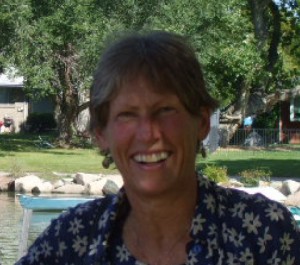Glustrom booted out of CO PUC proceedings!
October 2nd, 2011
WTF?!?! Leslie Glustrom has been denied intervention status by the Colorado Public Utilities Commission! Shades of what happened to me in Big Stone, and almost in the CapX 2020 Certificate of Need! She made her Petition/Motion to Intervene, and Xcel objected and the PUC booted her out. (I’m searching for the Order).
The story gives a pretty careful description of what happened, what’s missing is information on all the good work Leslie has done over the years, contributing to the record, helping come up with a better result, and now this…
Here’s Leslie at Nancy’s wedding a few years back:
Boulder energy watchdog kicked out of Xcel dockets at PUC
Sat September 17, 2011 9:18 PM | about: XEL
Xcel Energy and other investor-owned utilities that operate in Colorado are regulated by the PUC, which is made up of three commissioners appointed by the governor and approved by the Senate.
The PUC must give the OK before Xcel can raise rates, build a new power plant or install transmission lines, among other decisions. When Xcel asks the PUC for permission to move forward on such projects, other entities that would be impacted by the PUC’s decision can file a motion to “intervene” in the case.
Some entities — such as the staff of the PUC and Colorado’s Office of Consumer Council — are allowed to intervene in every docket “by right.” But other entities — such as Boulder-based Western Resource Advocates and Climax Molybdenum Company — must petition for permission to intervene.
To have their requests granted, those organizations must show that they have a “substantial” monetary interest (not just an academic interest) in the outcome of the docket and that no other intervening party “adequately” represents their interests, according to PUC spokesman Terry Bote.
Six years of involvement
In 2005, Glustrom — driven by concerns over climate change — began winning permission from the commission to intervene in dockets related to Xcel by claiming that she has an interest as a ratepayer and that no one else was completely representing her interest.
In the last six years, Glustrom has become a fixture at the PUC, participating in a dozen dockets that had to do with everything from rate increases, to the construction of the Comanche 3 coal plant in Pueblo, to the smart grid project in Boulder, to the way Xcel calculates the premium it charges for participation in its Windsource program.
Among the crowd of lawyers representing other parties, Glustrom, a scientist by training, has always represented herself, cross-examining witnesses, presenting evidence, and, perhaps most importantly, asking questions of Xcel that the utility is required to answer. Over the years, Glustrom’s “discovery questions” have included requests for Xcel to explain how it forecasts its coal costs and a request for a detailed breakdown for how Xcel spent the more than $40 million it cost the company to install Boulder’s smart grid.
“If you lose your ability to do discovery, that’s a really big deal,” Glustrom said. “You have to see the world according to Xcel.”
Adequate reprsentation
In July, Glustrom again petitioned to intervene in an Xcel docket, this one having to do with how the company should have to split its profits from selling renewable energy credits from its excess renewable energy production to other states, primarily California.
Later that month, Xcel filed a motion opposing Glustrom’s intervention, which argued that Glustrom could not prove that her interest in the docket was more than academic. Xcel also argued that her interest was adequately represented by the Office of Consumer Counsel.
In August, an administrative law judge agreed with Xcel, and earlier this month, the commissioners upheld the law judge’s stance, affirming that the OCC does “adequately,” if not “completely,” represent Glustrom.
“It is immaterial that her interest may not be ‘completely’ represented by another party, because this is not the applicable legal standard,” the commissioners wrote in their decision.
Consumer Counsel Bill Levis, head of the OCC, said his office is tasked with representing the public interest of residential, agricultural and small business ratepayers — not individuals, though he and Glustrom sometimes agree and sometimes disagree on what the outcome should be in a particular docket.
To determine how to best represent that larger public interest, Levis and his staffers consult with the state’s 11-member Utility Consumers Board, which is appointed by the governor, and they meet with organizations and groups that have a stake in the process.
“Not all residential consumers have the same interest,” Levis said. “By statute, the final decision on what to file is our decision.”
Different issues, different response
The PUC commissioners explained why Glustrom has previously been allowed to intervene in Xcel dockets with two points. First, the commissioners wrote that “Xcel generally has not opposed her intervention” and that the commission has the authority to depart from its own precedent.
Xcel Energy spokesman Gabriel Romero said Friday said that Xcel has sometimes opposed Glustrom’s participation in dockets in the past, depending on the subject, and that there are times when Xcel believes that Glustrom’s status as an intervenor is appropriate.
“It depends on the issue,” he said. “There are times when we feel that her participation is relevant and times when we don’t.”
The commission’s decision to oust Glustrom is troubling to attorney Dennis Kelly, who is also representing Glustrom in a couple of lawsuits that challenge the PUC’s decisions. Kelly’s concern is partly that relying on the argument that the OCC represents all individual ratepayers may bar any individual from participation in the future under any circumstance.
“Does this mean that any individual or group that represents individuals is going to be precluded from intervening?” he asked. “I don’t know. That would be pretty drastic. It really raises the question of what is the threshold of an intervenor and whether or not the commission has raised that threshold.”
Stricter approach
It appears that the commission — which recently added a new appointee, Joshua Epel — does believe that a higher standard should be put in place for intervenors.
“We believe a stricter approach to interventions will result in more streamlined and efficient Commission proceedings, which will lead to ‘the proper dispatch of business and the ends of justice,'” the commissioners wrote in their final decision on Glustrom’s intervention.
Romero said that Xcel also has concerns about allowing anyone who wants to participate in a docket to participate, regardless of their ability to convince the commission that they have more than an academic interest in the issue. A large number of intervenors could slow down the process of approving dockets, which can already drag on for more than a year in some cases.
“If we allowed everyone to participate, who knows how many people would be there?” he said.
Even if it becomes more difficult for individual ratepayers to intervene in a docket, the public can still comment on dockets.
“In any instance, any member of the public can submit written comments in any docket that are reviewed and considered by the commissioners,” the PUC’s Bote said.
While it’s not likely that many individual ratepayers have the time or the inclination to intervene in dockets, even if permitted, Glustrom — who works full-time on watch-dogging energy issues — said she thinks it’s critical that the opportunity remain open.
“Without someone from the public willing to go down there and do what I do, it just goes back into being a black box,” she said.
And Glustrom feels that ability is very much in danger. Last week, her petition to intervene in a second docket — this time related to Xcel’s bid to purchase wind power from a proposed 200-megawatt wind farm outside Limon — was also denied by the commissioners.
“They will use these precedents to keep me out from now on,” she said. “But I’m not going away.”


Leave a Reply